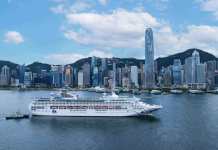SINGAPORE, 1 February 2024: US-headquartered Carnival Corporation is rerouting cruise ships scheduled to transit the Red Sea until the end of May this year.
In a press statement released Tuesday, Carnival Corporation confirmed it has rerouted itineraries for 12 ships across seven brands for the “safety and well-being of crew and guests following consultations with security experts and the government.”

Carnival Corporation is the largest global cruise company and among the largest leisure travel companies, with a portfolio of cruise lines — AIDA Cruises, Carnival Cruise Line, Costa Cruises, Cunard, Holland America Line, P&O Cruises (Australia), P&O Cruises (UK), Princess Cruises, and Seabourn.
Carnival Corporation reports the Red Sea rerouting is expected to have an adjusted earnings per share impact of USD0.07 to USD0.08 for the full year 2024, with the vast majority of the impact in the second quarter. The company has not seen an impact on booking trends due to the Red Sea situation and has no other Red Sea transits until November 2024.
Carnival is not the only cruise line adjusting itineraries due to the risk of attacks on shipping in the Red Sea, though to varying degrees depending on their scheduled itineraries over the next three to four months,
MSC Cruises has cancelled some Red Sea sailings, especially its “Grand Voyages” from South Africa. Due to security, Norwegian Cruise Lines and Royal Caribbean Line have cancelled or modified Red Sea itineraries. Italy’s Costa Cruises ( a brand under Carnival) announced earlier in January it was cancelling Red Sea transits.
Travel warnings
There are several travel advisories issued by governments regarding cruise ships passing through the Red Sea. The US Department of State, the UK and Australia warn of heightened risk of piracy and maritime attacks in the southern Red Sea, particularly off the coast of Yemen and Somalia. They advise cruise ships to exercise extreme caution and implement heightened security measures.
Avoiding the Red Sea
Rerouting to avoid the Red Sea means longer voyages detouring around Africa’s Cape of Good Hope adds seven to 10 days to itineraries. It also inflicts considerable costs on the cruise line. In addition to disrupting cruise schedules, it impacts passenger satisfaction and could lead to cancellations or postponement of trips going into summer if the security risks remain unresolved.
Cancelled Suez Canal transits
While not a major draw for most cruise lines, some world cruises use the Suez Canal to reduce sailing time from ports in the Mediterranean and destinations in the Indian Ocean. These itineraries could suffer major revisions to avoid the canal until safety can be assured. They cannot pass on the cost of extra sailing days around the Cape of Good Hope to passengers.
Lost revenue
Cancellations and altered itineraries lead to lost bookings and revenue for cruise lines. Longer voyages mean greater fuel consumption, pushing up operational costs.






